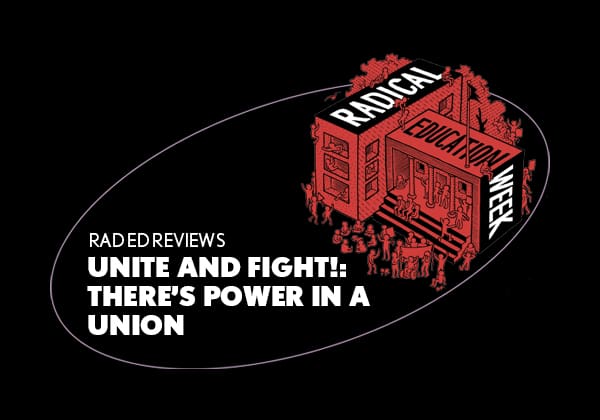With mass casualisation in workplaces and insufficient welfare payments, young people have felt the brunt of precarious employment throughout the pandemic. For the SRC’s annual Radical Education Week, now staggered out on zoom over the course of a few weeks, Lia Perkins chaired a panel to discuss union involvement — and how collective action can make substantive change in workplaces, and win basic rights for young people.
Lia opened the discussion by asking for the audience’s associative thoughts towards unions. Words like solidarity, shared struggle, collective power rolled in.
The first question was posed to panelist Stella Babidge, a member of the Retail and Fast Food Workers Union (RAFFWU), who was recently involved in the campaign for collective bargaining rights undertaken at bookshop Better Read Than Dead (BRTD).
Stella spoke to the fact that the collective bargaining was “the culmination of a year long struggle of workers.” Discussions had begun due to issues in the workplace which had become more pressing overtime, compelling people to quit. Stella also cited bullying, casualisation and working beyond pay-rate as reasons why people left.
Perceptive ideas were brought up about the hurdles required to carry out successful collective action.
After nominating RAFFWU as their representative, and achieving a Protected Action Ballot Order, workers at BRTD were able to partake in industrial action without risking the termination of their contracts. This allowed workers to go on strike, withdraw labour, and refuse overtime hours.
The action resulted in a number of wins for workers, including contract conversions which offer workers part-time contracts after six months, paid domestic violence and parental leave, and the abolition of junior rates, marking a significant gain for young workers.
The audience also heard from panelist Cooper Forsyth, who spoke about his experience in mobilising his workplace, the Enmore Aquatic Centre. Forsyth spoke to staff’s initial pessimism about unions, until workers started seeing change by collectivising: “[There was a] palpable sense that people didn’t see the union as something that was serious or would make a difference until we started to take action.”
With support from the United Workers Union (UWU), Forsyth was able to acquire better conditions for his workplace, including the workplace making treatment available for chlorine damage that can occur working as a swim teacher. Union efforts garnered support from local papers and councillors.
Panelist Evan Van Zijil, Sydney Coordinator of the Australian Unemployed Workers Union (AUWU), discussed the shared struggles of young people in casualised and precarious work. They spoke of collaborating with the UWU in organising efforts, such as car convoys, to demand adequate financial support for workers who have had hours cut without sufficient government compensation.
Conversation opened up to the floor — with UWU delegate Anja Burrill speaking to the struggle of organising students to bargain for their own rights, citing a degree of pessimism in the system. She suggested that working casual jobs concurrently with full-time study could also be a reason for this, as students can feel “not fully invested in working conditions [they] experience, as they feel temporary.”
With support from the UWU, Burrill was able to acquire the equipment to do her work as a call centre operator from home that management refused to provide. She had gone seven weeks with “no equipment, no shifts, no money, and no supplement.”
Conversations were had surrounding the dichotomy of union bureaucracy. Speakers mentioned that at times they had to struggle with union officials to obtain the rights they wanted, particularly in situations where the union was willing to compromise or concede.
Unions were identified as a means to arm ourselves, as workers and as young people, against exploitative practices in our workplaces. With difficult, and at times, bureaucratic systems still in place at entities such as the Fair Work Commission, the collective organisation of workers is a powerful means to ensure that rights are upheld, and that workers are protected.
If you’d like to get in touch about organising your call centre contact Anja on 0404 715 770, or at anjaburrill@gmail.com.





